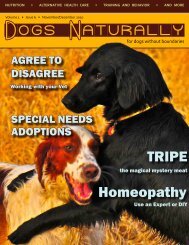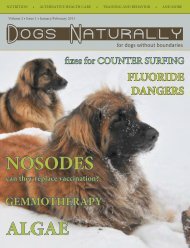July/August 2010 - Dogs Naturally Magazine
July/August 2010 - Dogs Naturally Magazine
July/August 2010 - Dogs Naturally Magazine
You also want an ePaper? Increase the reach of your titles
YUMPU automatically turns print PDFs into web optimized ePapers that Google loves.
Take a look at the map above, courtesy<br />
of the Heartworm Society. As expected,<br />
dark areas of the map, which<br />
show the most heartworm cases per<br />
clinic, are found in the hot, humid<br />
Southeastern US, especially the Atlantic<br />
and Gulf coasts and Mississippi Delta.<br />
Don’t let the map scare you. If published<br />
seasonally, map colors would<br />
pale significantly during cool months.<br />
Also remember that you’re seeing generalities,<br />
not specifics. A clinic near a<br />
rural pond will likely have many cases<br />
while an urban clinic 15 miles<br />
away may have a much lower incidence.<br />
Maps are general. Determine<br />
your own microclimate. Ask your vet<br />
how many cases of heartworm infection<br />
he/she treated in the past<br />
year. Also ask if he/she treats all positive<br />
cases, or just those with advanced<br />
infestation. If the vet doesn’t keep detailed<br />
records, that should tell you<br />
something.<br />
Conservative start/stop maps from<br />
heartworm researchers Drs. David<br />
Knight and James Lok (in “Seasonality<br />
of Heartworm Infections and Implications<br />
for Chemoprophylaxis”) show<br />
only two areas requiring year round<br />
heartworm meds: the southernmost<br />
areas of Florida and Texas. Houston,<br />
New Orleans and similar areas are<br />
shown requiring meds for 9<br />
months. Other states range from 3-7<br />
months. The Drs. wrote: “For nearly<br />
80% of the states, the potential for<br />
heartworm transmission is limited to 6<br />
months or less.”<br />
The Heartworm Society warns that<br />
heartworm infections are getting<br />
worse. DVM <strong>Magazine</strong>, a magazine for<br />
vets, reports that recent results do<br />
show a rise in the number of positive<br />
cases per clinic in 31 states.<br />
DMV reports: “The reasons likely are<br />
multifactorial, including increased<br />
heartworm testing, increased client<br />
base per clinic or even climate trends.”<br />
Does Year Round Medicating Bring<br />
Extra Protection?<br />
Applying sunscreen at night is useless.<br />
So is taking heartworm medication<br />
when climate conditions prevent<br />
transmission. Only a small percentage<br />
of climates permit year-round transmission.<br />
Everyone else is unnecessarily<br />
subsidizing drug companies and<br />
“preventatives” sellers and, more im-<br />
portantly, exposing their dog to unnecessary<br />
risks.<br />
Two exceptions: 1) “Forgetful” and irresponsible<br />
pet parents who won’t begin<br />
the medication on time or build<br />
their dog’s natural immunity might<br />
want to medicate year round, although<br />
that means they have to remember to<br />
give meds every month. 2) If your dog<br />
contracts heartworms within a few<br />
years of beginning medication … and<br />
you can show you gave meds year<br />
round … and your dog had the required<br />
blood tests (2 or 3), you may benefit a<br />
little financially because drug companies<br />
will pay for dog’s treatment.<br />
Are Heartworm Preventatives Safe?<br />
You’ve seen those scary photos of<br />
worm-strangled hearts,<br />
right? Shouldn’t you give meds year<br />
round just in case? Isn’t safe better<br />
than sorry?<br />
But is that harmless little pill or yummie<br />
medical “brownie” really safe? No<br />
drug is completely free of risk and adverse<br />
reactions. I can find no long-term<br />
studies regarding cancer risks and or-<br />
<strong>Dogs</strong>...<strong>Naturally</strong>! <strong>July</strong>/<strong>August</strong> <strong>2010</strong>












